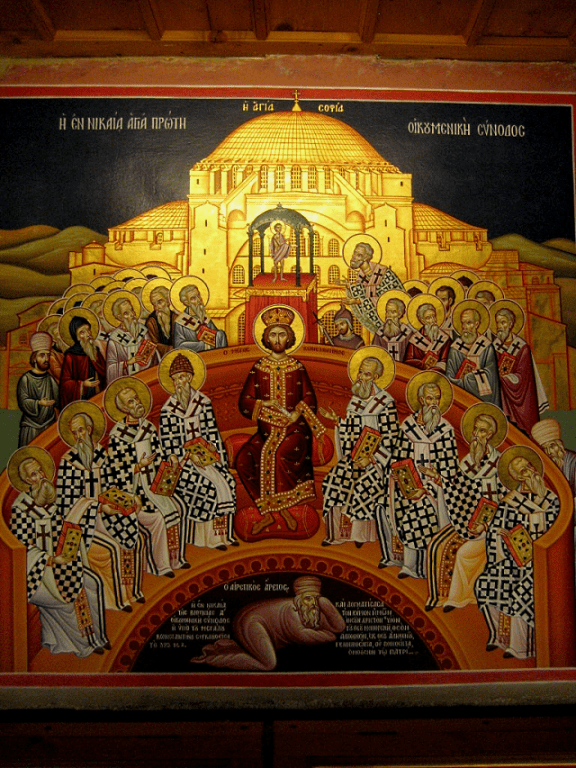Does the Phrase “Unanimous Consent of the Fathers” Allow Any Exceptions?

The term “unanimous consent” — as used in an ecclesiological / patristic context –, does not mean “absolutely every” — as it is commonly used today in general usage, but rather, “consensus of the vast majority” in line with the magisterium of the Church. See a short paper by Catholic apologist Steve Ray that explains this.
Many critics of the Catholic Church question this meaning, and think we are playing games and special pleading. For example, Baptist anti-Catholic polemicist Ken Temple (in our exchange on this topic originally included in this paper) wrote:
Tertullian, Origen, Chrysostom, Cyril of Alexandria, Basil, Hillary – 6 of the Early Church fathers who taught that Mary had sinned. The early church fathers who believed that Mary sinned, . . . completely destroys this idea of “the unanimous consent of the fathers”, a completely non-historical claim.
Your argumentation just doesn’t fly with logic, reason, normal use of language; nor history. It is a modern attempt to escape the implications of this; for if your church is wrong on one thing; the whole thing falls. And it is wrong on many things, especially the Marian dogmas and the “unanimous consent of the fathers” statements — these things fell your Infallibility dogma and the whole RCC system like a giant oak tree falling down.
Ken has produced six fathers who denied the sinlessness of Mary. I have 61 fathers listed in my first book (of three) on the Church fathers. I have documented for many of these, that they accepted Mary’s sinlessness.
The Assumption was a very slowly developing doctrine and difficult to find at all in many fathers, but that gives me no pause over against Protestantism, since the two pillars of Protestantism, sola Scriptura and sola fide, are scarcely found at all among the fathers (I devoted over 100 pages to the utter lack of the first concept in my book), and the canon of Scripture is a completely “unbiblical” doctrine, where the Protestant has to inconsistently rely on the infallibility of Catholic Church tradition.
If you think 5-10% dissent in the fathers regarding particular issues is a problem for us, why is not 95-100% dissent in the fathers and complete absence in Scripture as well (canon, Bible alone) not a problem for you? Goose and gander.
Moreover, in my “live chat” debate (12-29-00) with Bishop “Dr.” [???] James White: the most influential and voluminous anti-Catholic critic writing today, we discussed this notion of Church fathers who thought Mary sinned. Readers may judge who got the better of that argument; whose case was more plausible. And I was answering on the spur of the moment, with no notes or preparation at all. I added “footnotes” later: further nailing down my solid case; and I also later analyzed how White was enlisting wholesale sophistry in his argumentation that night.
***
Dictionary meanings for the term unanimity bear out the traditional Catholic theological understanding, too. For example, Roget’s Thesaurus provides the following synonyms for unanimity:
unanimity (520.5; under general category, “Assent”)
like-mindedness, meeting of minds, concurrence, consent, accord, general agreement, consensus, consensus of opinion, general acclamation. [partial list] (New York: Thomas Y. Crowell Co., 3rd edition, 1962, p. 339)
Likewise, Dictionary.com defines “consensus” as follows:
majority of opinion: The consensus of the group was that they should meet twice a month.
general agreement or concord; harmony.
The Latin phrase used in the Catholic Church is unanimem consensum Patrum. Note St. Vincent of Lerins’ famous passage, from the 5th century:
In the Catholic Church itself, all possible care must be taken, that we hold that Faith which has been believed everywhere, always, by all. For that is truly and in the strictest sense ‘Catholic,’ which, as the name itself and the reason of the thing declare, comprehends all universally. This rule we shall observe if we follow universality, antiquity, consent. We shall follow universality if we confess that one Faith to be true, which the whole Church throughout the world confesses; antiquity, if we in no wise depart from those interpretations which it is manifest were notoriously held by our holy ancestors and fathers; consent, in like manner, if in antiquity itself we adhere to the consentient definitions and determinations of all, or at the least of almost all priests and doctors. (Commonitory, 2; my emphasis)
See how he qualifies it at the end? This passage is often used polemically against Catholics. So if it is to be so used, then let our detractors at least understand its meaning properly. The same book is also the most explicit exposition of the notion of development of doctrine in the Church fathers.
The meaning as used by Catholics is completely possible and permissible by the rules of etymology and definition. Someone wants to quibble? Then they have to go after dictionary and thesaurus; it’s no longer a Catholic problem, but a problem of critics of this understanding battling with established, documented usage.
***
(originally 4-29-08; revised on 10-22-18)
Photo credit: Jjensen (8-23-08). Icon from the Mégalo Metéoron Monastery in Greece, representing the First Ecumenical Council of Nicaea in 325 A.D., with the condemned Arius in the bottom of the icon. [Wikimedia Commons / Creative Commons Attribution-Share Alike 3.0 Unported license]
***













